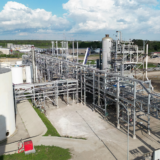
ExxonMobil projects strong future for synthetic lubricants
ExxonMobil has expressed long-term optimism for synthetic lubricants, citing industry trends that support sustained growth. Speaking at F+L Week 2025, held on 13-14 March in Bali, Indonesia, Sarah Horne, vice president of Synthetic Base Stocks at ExxonMobil Product Solutions, outlined key drivers behind this projected expansion.
Horne highlighted that synthetic lubricants are expected to see an annual growth rate of 4% from 2023 to 2028, driven by increasing energy and fuel efficiency demands, advancements in high-performance engines, stricter emissions regulations, and the expanding adoption of electric vehicles (EVs).
Energy outlook to 2050
Horne’s presentation, titled Global Outlook: Our View to 2050, examined ExxonMobil’s projections for global energy demand and supply. The company anticipates that by 2050, the world’s population will grow by 2 billion people, and the global economy will double in size. Meeting the energy needs of this expanded population will require 15% more energy, while carbon emissions are projected to decline by 25%.
ExxonMobil’s analysis suggests that all energy sources will remain crucial, with renewables like solar and wind experiencing the fastest growth. Coal consumption is expected to decline the most, while oil and natural gas will continue to supply 54% of the world’s energy needs.
Horne noted that the Asia-Pacific region will see significant economic and demographic changes by 2050, with GDP increasing by USD50 trillion and an additional 400 million people. While energy demand in the region is expected to rise by 25%, carbon emissions are projected to fall by the same percentage, underscoring a strong commitment to sustainability.
Despite the growth of renewables, Horne stressed that scaling up low-carbon technologies will require government support and robust policy frameworks. ExxonMobil remains committed to advancing synthetic lubricants and energy solutions that balance efficiency, sustainability, and performance.
Horne’s insights reaffirm ExxonMobil’s belief in the long-term relevance of synthetic lubricants in an evolving energy landscape, reinforcing the industry’s shift towards high-performance, lower-emission solutions.












